Fruit trees use a lot of energy compared to other types of plants, as growing fruit is a laborious one and has more energy-consuming activity for it. Lemon trees regularly require high nitrogen fertilizer during the growing season. Lemon trees are 10 to 20 feet long and 10 to 15 feet wide, depending on the species.
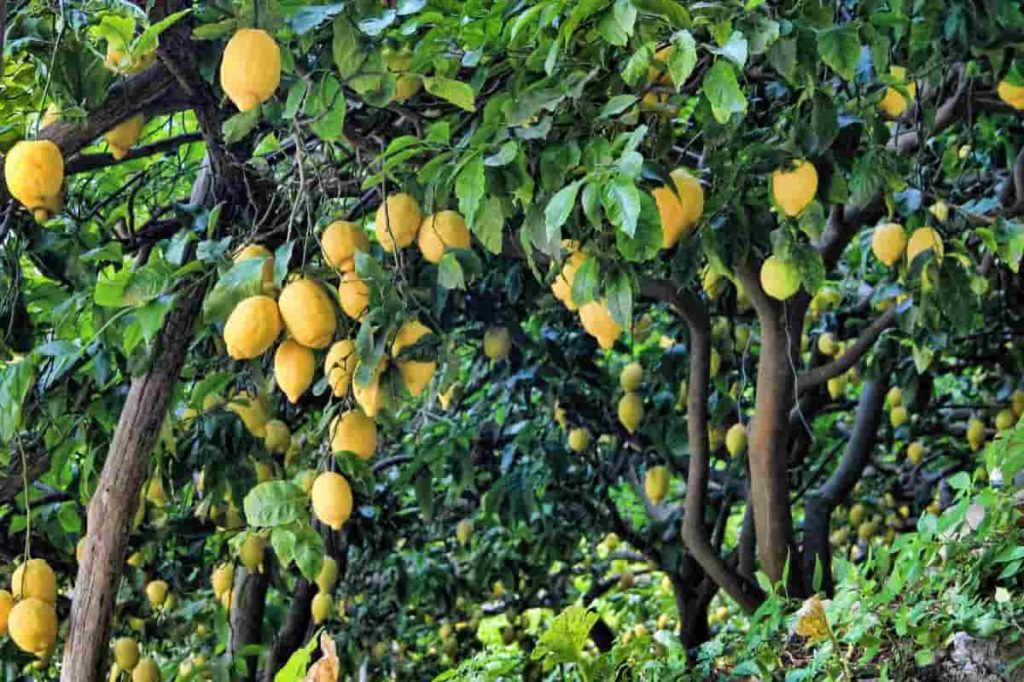
Newly planted trees require very little fertilizer but as they grow, the need for tree manure increases. Lemon trees grow best in fertile, well-drained soil in full sunny spaces. There are different fertilizing schedules for young Lemon trees and mature or fruity Lemon trees. Let’s check the best fertilizer for Lemon trees.
Best fertilizer for lemon Trees
Compost manure for Lemon trees
Well-composted cow manure provides a more natural approach. Just use the fertilizer well, and apply it only in the fall. Gently work it into the soil, and water well. Compost is high in salts, but winter rains help to remove salts away from the sensitive roots of the Lemon tree. Add manure to the soil around the sour tree to add other nutrients to the soil.
Spread around 2 inches of compost, but keep the bark at least two inches away from the stem to avoid damage. For young trees, use 1 gallon of manure per tree every year. As a general guide, 46 kg of well-composted cow manure is equal to 46 grams of actual nitrogen.
In case you miss this: Lemon Gardening For Beginners, How To Start, FAQs
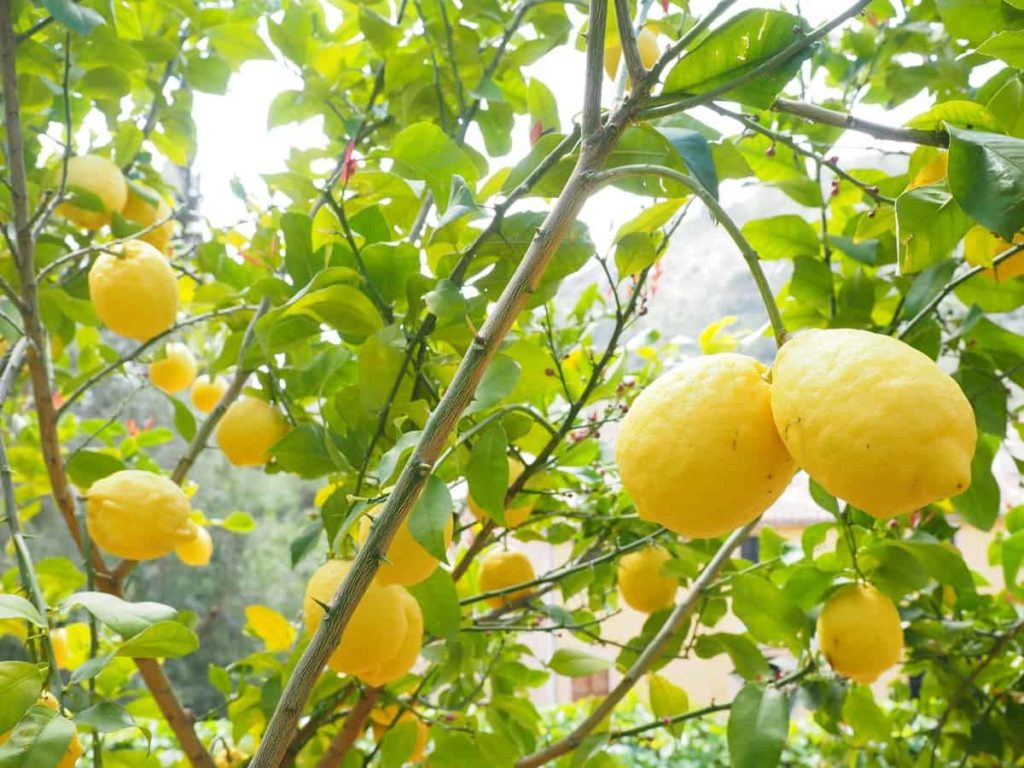
Natural fertilizers for Lemon tress
- You can make fertilizer by designating an area and allowing things like leaves, grass trimming, small twigs, and old mulch to break down. Add grass trimmings from your lawn to soil to add nitrogen. Scratch any mulch away from the base of the Lemon tree and sprinkle the clippings on the soil. Water the soil after adding any kind of fertilizer. This will prevent any irritation that can cause fertilizer or various materials to lie on dry soil.
- Move the mulch back, and the water regularly to maintain moisture from 8 to 12 inches. Mulch adds extra nutrients to the soil as it breaks down and also helps in maintaining moisture. You can use blood meal instead of grass clippings to add nitrogen to the soil.
- Coffee grounds are good for Lemon trees as they provide the nitrogen and acidity that the soil wants. The ideal soil pH level for Lemon trees is between 6.0 and 7.0.
Homemade liquid fertilizers for Lemon trees
- Fill a glass jar with leaves, trunks, and flowers that are sifted with a Comfrey herb. Pack the material firmly in the jar and fill it with water. Allow jars to sit in the sun for the whole day to ferment. Sift the herbs and use water to compost around your Lemon tree. This can be done monthly.
- Fill a glass jar with leaves, flowers, and stems of stinging nettle, pack them firmly in the jar. Fill the jar with water and keep it in a sunny area for a day. Sift the herbs, wear gloves again, and use the liquid as ground manure for your Lemon trees. This can also be performed monthly.
In case you miss this: Lemon Growing Tips, Ideas, Secrets, and Techniques
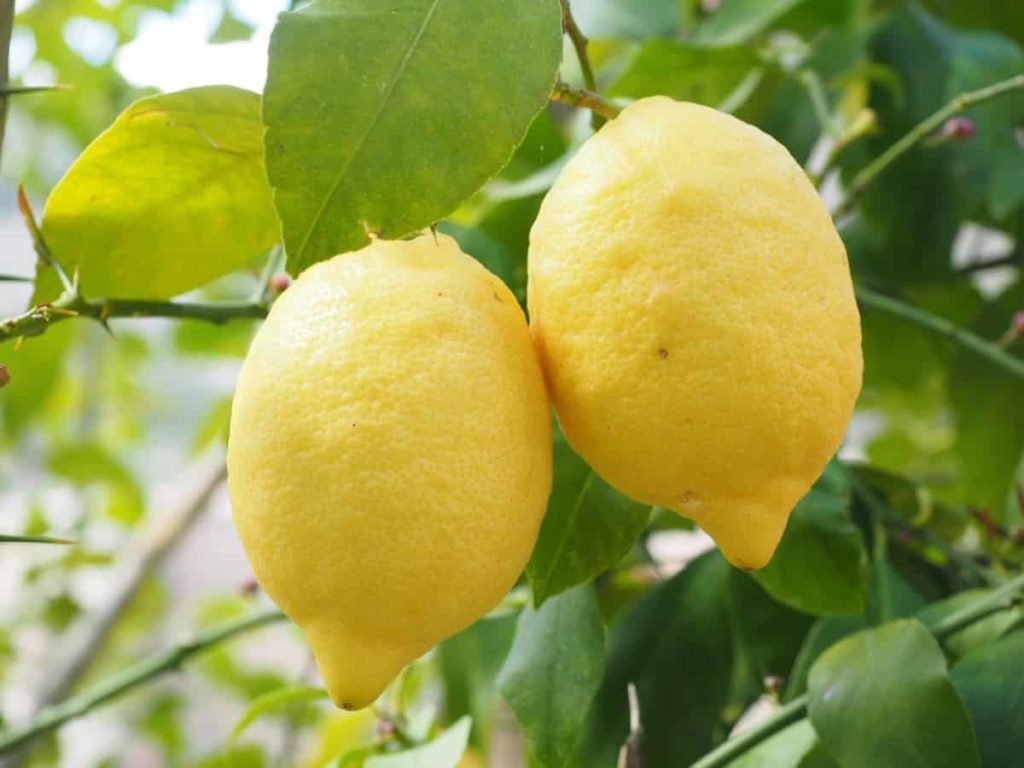
Organic fertilizers for Lemon trees
- Animal waste such as chicken manure contains high amounts of nitrogen which is used by Lemon trees after it is well composted. Legume plants, which cure nitrogen in the soil, are composted and mixed with soil to add more nitrogen. Although these sources enrich the soil, they do not contain enough nitrogen for hungry Lemon trees when used alone.
- Fill a 5-gallon plastic bucket with a straw. Choose a straw that is either moist or left in the sun so that it rots for several days or weeks. Cut a portion of the chicken wire into sizes, and keep it flat over the straw. Place a brick or large rock on a chicken wire to prevent the straw from floating. A gallon of fresh or dry manure on top of the straw. Before adding a second of straw, a gallon of a pea on the fertilizer.
- Once again, cover the straw with a chicken wire and weigh it with a brick to prevent it from floating. Spread one last, 1 gallon of dry or fresh manure on straw. Pour hot water into the bucket until it reaches the top. Set the bucket in a sunny place and let it last for six to nine months, at least stir the material with a weekly pitchfork or shovel. Stirring introduces air into products, which are essential for keeping the moisture as well as the bacteria alive and active. Spread 1 gallon of organic manure tea around young trees by the age of 3. Work tea in the soil with a whip or shovel. An old tree requires 1/2 inches of soil on the dripline.
- Sprinkle bone meal on the soil surface to add phosphorus. Phosphorus helps the Lemon tree bloom.
Commercial fertilizers for Lemon trees
Newly planted young Lemons need root growth to deal with additional nutrients. Wait until there are 6 to 8 inches of new growth to feed.
In case you miss this: Growing Lemon Balm At Home – A Planting Guide
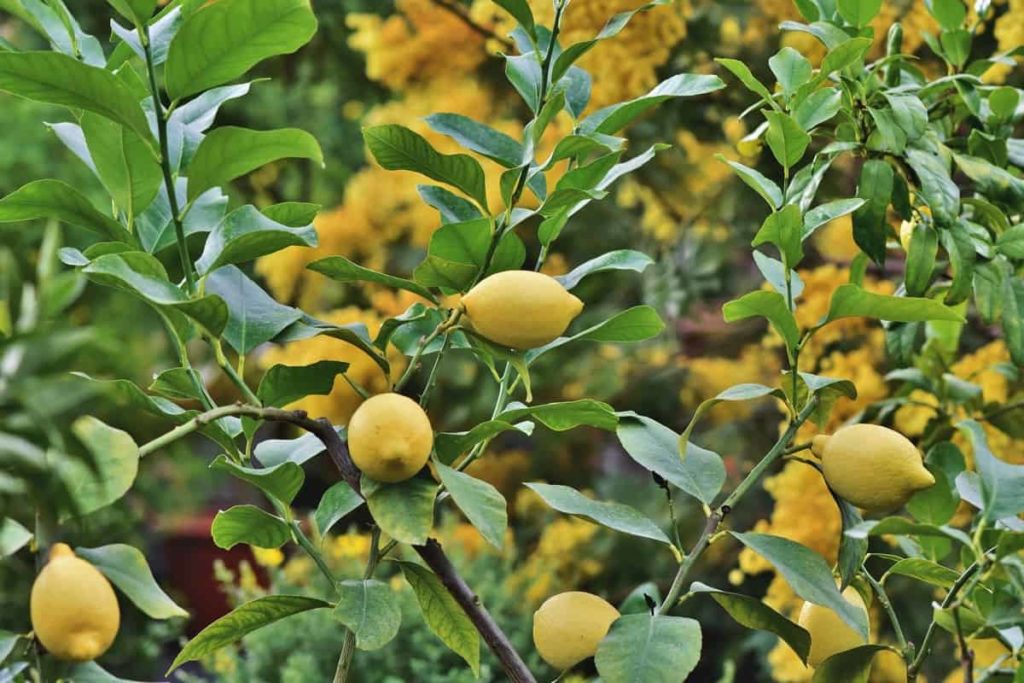
NPK ratio- Nitrogen ratio should not exceed 8-8-8 when finding fertilizer for a Lemon tree. This is the value of NPK which is found on the label. It means nitrogen, phosphorus, and potassium. It is better to feed Lemon trees in the growing season. Divide nitrogen applications into three feedings. Apply nitrogen in February, May, and September. Not feeding the tree in winter when fresh growth is at risk of winter loss.
Fertilizer’s schedule
Starting in early spring, fertilize your Lemon tree once every 4 to 6 weeks during summer. Fertilizing at intervals of 4 to 6 weeks during active growth will ensure that your Lemon tree has access to enough nutrients to grow and produce fruits. When your Lemon tree slows down production at the end of summer, stop fertilization by next spring. Be sure to fertilize your Lemon tree every year during proper seasons.
If watering your Lemon tree every 4 to 6 weeks during the growing season seems like a potentially disturbing commitment, there are also ways to slow-release fertilizer that reduce the frequency with which you need to fertilize. Usually, a slow-release comes in the form of manure bananas that you insert into the soil of a Lemon tree. If using a fertilizer with slow-release procedures, you’ll need to fertilize your Lemon tree only once a year, in early spring.
When Lemon trees are first applied with nitrogen or nitrogen-heavy fertilizers, the top of the year is usually the best time of the year just before it opens. For the second request, go for round three with spring and then summer. If choosing micronutrients, apply them with emerging new growth in spring. For organic citrus foods like manure or blood meal, stick with autumn applications to protect the tree canopy.
Newly planted trees
Newly planted Lemon trees grown in average or poor soil benefit from a little more nitrogen fertilizer in their first year. Fertilizers contain various amounts of nitrogen. A good fertilizer for Lemon trees is ammonium sulfate, which contains 21% nitrogen. Newly planted Lemon trees growing in deep, fertile, organically rich soil do not need manure in their first year.
In case you miss this: Growing Lemon Trees Hydroponically – For Beginners
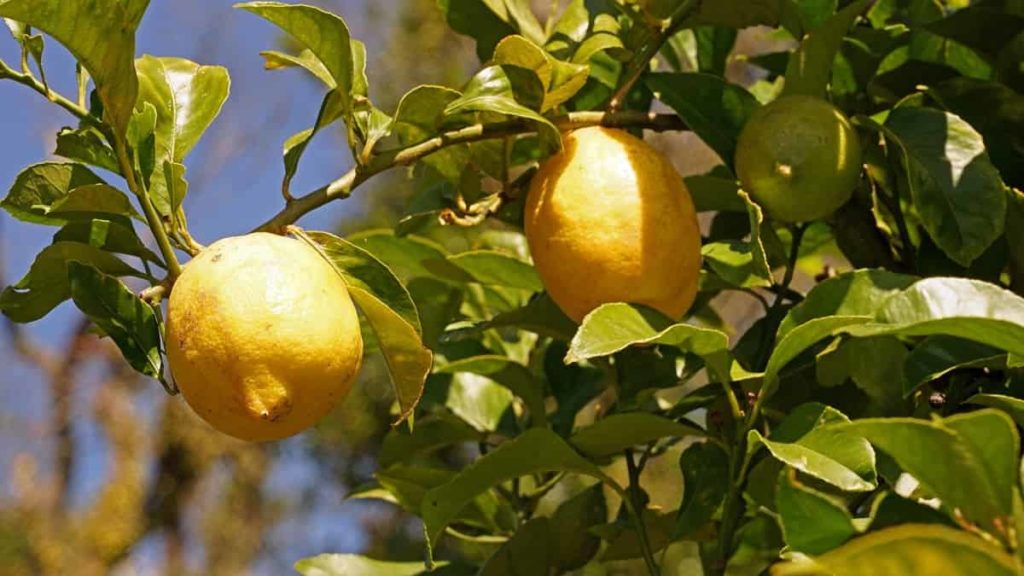
When new growth appears, fertilize the newly planted lemon trees. Sprinkle 60 to 70 grams of ammonium sulfate around the tree bases, but avoid their trunks. Re-fertilize the trees in late spring or early summer, when the second flush of growth is often revealed. Apply fertilizer for the third time in late fall, when usually one-third of growth flushes.
Young Lemon trees
Young Lemon trees require 120 to 230 grams of nitrogen annually, which is added to 600 to 1000 grams of ammonium sulfate. In the first and second years of planting, sprinkle 200 grams of ammonium sulfate inside tree drip lines in spring, summer, and fall when new growth appears. The drip line is the line on the ground where rain drips from the tree canopy. Do not let manure touch the trunks of trees. In the third year of planting, sprinkle 300 grams of ammonium sulfate inside the tree drip lines when you see new growth in spring, summer, and fall.
Mature Lemon trees
The fertilizer requirements of mature Lemon trees vary according to the size and age of the trees. For example, small trees that have been in the ground for four years require 340 grams of nitrogen, which is added to 1.5 kg of ammonium sulfate annually, and medium-sized Lemon trees that have been growing for five years need 450 grams of nitrogen or 2.1 kg of ammonium sulfate. Divide the fertilizer into three parts, and apply each part when new growth appears in spring, summer, and fall.
Large Lemon trees that are growing for six years or more and have not been sorted to limit their size need 680 grams of nitrogen, which is included in 3.2 kg of ammonium sulfate. High fertility in Lemon trees can be a problem leading to more green, leafy growth and reduced fruit production. Do not apply more than the recommended quantity of manure unless trees are showing signs of nitrogen deficiency, such as yellow old leaves, premature leaf drop, and small, thin-skinned fruit.
How to fertilize Lemon trees in pots
All the plants of the Citrus family are heavy feeders. Lemon requires fertilizers for the production of juicy fruit, lush leaves, and aromatic flowers. Find fertilizers that contain micronutrients, especially iron, manganese, and zinc. If you are not using slower release fertilizer, promote your Lemon tree by applying water-soluble fertilizer once a month in the growing season.
Occasionally, side-dress your plant with compost or well rotten manure. Apply compost to the soil if you want to grow your Lemon tree faster and become healthy. You can add one or two cups of plain yogurt (without extra color or taste) in 4 to 6 weeks around the base of the Lemon tree to observe strong growth.
In case you miss this: Growing Dwarf Lemon Trees – In Containers, Pots
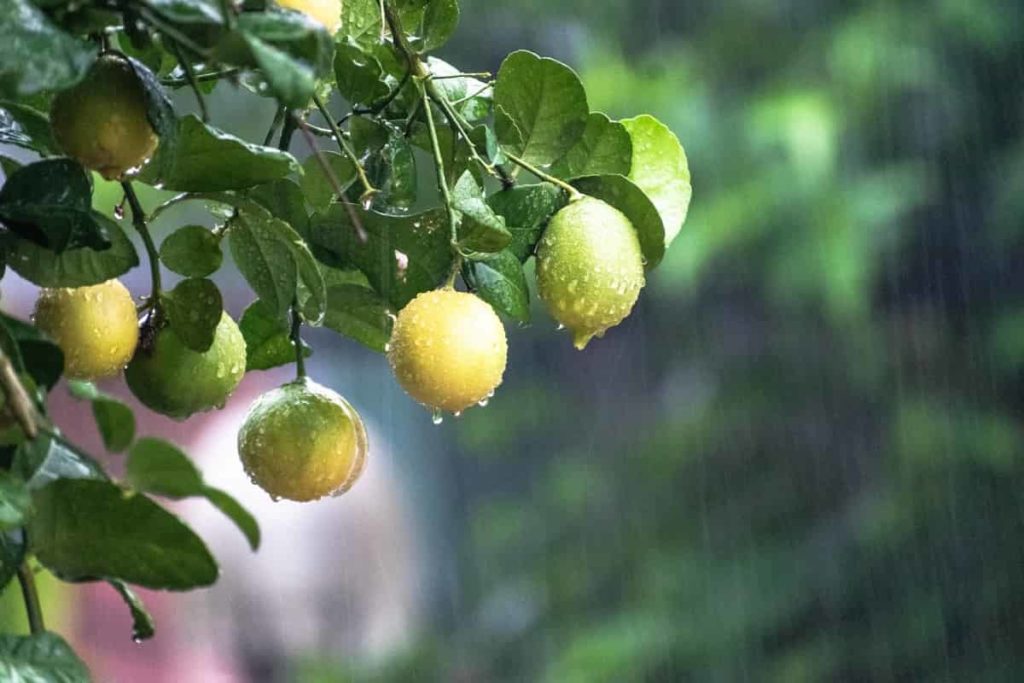
Never apply manure during the first year of plant growth as it will cause root burns and tree destruction. Apply slow-release fertilizer once every two months in spring and summer starting in year twLemono. In winter, apply once every 3 months around the base of the tree. Then apply about 30 seconds of water after that. You would like to apply a fertilizer that has at least twice the amount of nitrogen as it does phosphorus and potassium, also known as 2-1-1 fertilizer.
Frequently asked questions about fertilizers for Lemon trees
Are eggshells good for Lemon trees?
Eggshells are the best source of calcium will cause citrus trees like Lemon, orange, lime, and beetroot to be healthy, with shiny green leaves. Flowers hold better and fruits are abundant.
Why is my Lemon tree producing small Lemon?
Water stress is a common reason for small fruits drying up and falling off a tree in late spring and early summer. Once the fruit is a little older, trees can withstand considerable water stress without fruit loss, however fruit size can decrease significantly.
Is Epsom salt good for Lemon trees?
Epsom is a form of magnesium they are an effective and easy soil modification to treat magnesium deficiency in Lemon trees. Your Lemon tree must have enough magnesium to thrive and produce for years to come.
What happens if you over-fertilize Lemon trees?
If you apply too much fertilizer you can kill the tree. Applying high levels of quick-released nitrogen can burn the roots when applied to the soil and burn leaves when applied as a foliar spray or wet.
Why didn’t my Lemon tree flower?
Flowers led to fruit, and a lack of flowers means your tree can’t produce. Some of the reasons for this will be miscultivation, lack of nutrients, inadequate water, and bad rootstocks. If the plant opens but still fails to take fruit, it could be because the tree is not old enough.
- How to Grow Hibiscus from Flower
- Plantation Ideas for Home Decoration: A Beginners Guide
- Flower Garden Designs and Layouts for Beginners
- Planting and Spacing Techniques in Papaya: A Beginner’s Guide
- Growing Gold: Essential Techniques for Planting Pineapples
- How to Make Kalanchoe Plant Bushy: Home Remedies and Solutions
- 11 Reasons Why Your Gardenia is Not Blooming: Home Remedies and Solutions
- Eco Elegance: The Guide to Designing a Drought-Tolerant Landscape
- Gardening on a Slope: Strategies for Hillside Landscaping
- Nourish and Flourish: Top Organic Mulches for Thriving House Plants
- Everything You Want to Know about Indian Mogra Flower: Discover Uses and Growing
- Green Thumb Success: Expert Tips for Cultivating Greenhouse Pumpkins All Year Round
- Maximize Growth & Flavor: The Ultimate Guide to Companion Planting in Herb Gardens
- How to Control Rhododendron Problems Naturally: Home Remedies and Organic Ways to Fix Them
- Natural Magic: The Remarkable Benefits of Cinnamon for Plants
- Best Steps to Revive Dying Tulip with Natural and Organic Treatment
- 10 Reasons Why Your Angel Trumpet is Not Blooming: Remedies and Treatment
- How to Fix Periwinkle Leaf and Flower-Related Problems: Natural Remedies and Solutions
- How to Fix Zinnias Leaf and Flower Problems: Discover Natural and Home Remedies
- Organic Steps to Induce Lemon Tree Flowers: A Comprehensive Guide
- Bloom Booster: Crafting the Perfect Homemade Bougainvillea Fertilizer
- Optimizing Growth: A Guide to Applying NPK Fertilizer for Potted Plants
- 10 Best Homemade Fertilizers for Rubber Plant: DIY Recipes and Application Method
- How to Boost Female Pumpkin Flowers: Effective Steps for More Flowers and High Yields
- Transform Your Indoor Garden: Top Benefits of Pink Salt for Houseplants
- 10 Best Homemade Fertilizers for Peacock Plants (Calathea): Easy DIY Guide
- Unlock Blooms: 9 Reasons Why Your Potted Chrysanthemum is Not Blooming
- 8 Reasons Why Your Potted Hibiscus is Not Blooming: Fix it with Simple Solutions
- Unlock Blooms: 9 Key Reasons Your Potted Frangipani Won’t Flower
- 10 Reasons Why Is My Ice Plant Not Blooming: Remedies and Treatment
- 10 Reasons Why My Potted Hydrangea Not Blooming: Treatment and Remedies
- 10 Reasons Why is My Wisteria Not Blooming: Remedies and Treatment
- 10 Reasons Why is My Goldfish Plant Not Blooming: Remedies and Treatment
- Maximize Your Space: Ultimate Guide to Balcony Gardening with Grow Bags
- 10 Reasons Why Your Iris is Not Blooming: Remedies and Treatment
- 10 Reasons Why Your Anthurium Plant is Not Blooming: Treatment and Remedies